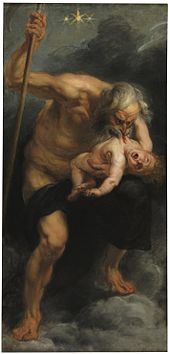Ο Κρόνος ήταν ο ηγέτης και ο νεώτερος της πρώτης γενεάς των τιτάνων, θεών απόγονων της Γαίας και του Ουρανού. Νίκησε τον πατέρα του, τον Ουρανό, και κυβέρνησε κατά τη διάρκεια της μυθολογικής χρυσής εποχής, έως ότου νικήθηκε από το γιο του, τον Δία.
Ήταν ο μικρότερος σε ηλικία και δύναμη από τους Τιτάνες, αλλά ο πιο πονηρός και φιλόδοξος. Ανέτρεψε τον πατέρα του με την βοήθεια της Γαίας, αλλά φοβούμενος μια ίδια μοίρα κατάπινε τα παιδιά του. Η γυναίκα του και αδερφή του Ρέα έκρυψε το τελευταίο τους παιδί, τον Δία, και έδωσε στον Κρόνο μια φασκιωμένη πέτρα για να καταπιεί, αντί για το μωρό. Ο Δίας, όταν μεγάλωσε, ελευθέρωσε και τα υπόλοιπα αδέρφια του δίνοντας στον Κρόνο να καταπιεί δηλητήριο. Στον πόλεμο που ακολούθησε μεταξύ των Τιτάνων και των Ολύμπιων, την Τιτανομαχία, που κράτησε 10 χρόνια, ο Κρόνος και οι Τιτάνες σύμμαχοι του νικήθηκαν και φυλακίστηκαν στα Τάρταρα.
Κατά τη διάρκεια της χρυσής εποχής ο Κρόνος λατρεύονταν ως θεότητα της σοδειάς και των συγκομιδών, ενώ επιτηρούσε και την πρόοδο των ανθρώπων. Απεικονιζόταν συνήθως με ένα κρυστάλλινο δρεπάνι, το οποίο χρησιμοποιούσε για να συγκομίσει τις σοδειές και ήταν επίσης το όπλο που χρησιμοποίησε για να ευνουχίσει και να καθαιρέσει τον Ουρανό. Μια γιορτή που ονομαζόταν Κρόνια γινόταν προς τιμή του Κρόνου στην Αθήνα τη δωδέκατη ημέρα του μήνα Εκατομβαιώνα, αλλά και στην αρχαία Ολυμπία.
Η ετυμολογία του ονόματος δεν είναι ξεκάθαρη. Μπορεί να σημαίνει «κερασφόρος», αλλά πολλοί ερευνητές υποστηρίζουν ότι το όνομα προέρχεται από τον αρχαίο ινδικό δαίμονα Kroni. Στην Αλεξανδρινή περίοδο αλλά και την εποχή της Αναγέννησης στη λατινική γλώσσα υπήρξε κάποια σύγχυση της λέξης Κρόνος (Cronos) με αυτή του χρόνου (Chronos).
Pronunciation
- (5th BC Attic): IPA: /krónos/
- (1st BC Egyptian): IPA: /krónos/
- (4th AD Koine): IPA: /krónos/
- (10th AD Byzantine): IPA: /krónos/
- (15th AD Constantinopolitan): IPA: /kɾónos/
Proper noun
Κρόνος (genitive Κρόνου) m, second declension; (Kronos)
Inflection
| Case / # | Singular |
|---|---|
| Nominative | Κρόνος |
| Genitive | Κρόνου |
| Dative | Κρόνῳ |
| Accusative | Κρόνον |
| Vocative | Κρόνε |
Derived terms
Descendants
In the most classic and well known version of Greek mythology, Cronus or Kronos[1] (Ancient Greek: Κρόνος, pronounced [krónos]) was the leader and the youngest of the first generation of Titans, divine descendants of Gaia, the earth, and Uranus, the sky. He overthrew his father and ruled during the mythological Golden Age, until he was overthrown by his own son, Zeus and imprisoned in Tartarus.
Cronus was usually depicted with a sickle or scythe, which was also the instrument he used to castrate and depose Uranus, his father. In Athens, on the twelfth day of the Attic month of Hekatombaion, a festival called Kronia was held in honour of Cronus to celebrate the harvest, suggesting that, as a result of his association with the virtuous Golden Age, Cronus continued to preside as a patron of harvest. Cronus was also identified in classical antiquity with the Roman deity Saturn.
In ancient myth recorded by Hesiod‘s Theogony, Cronus envied the power of his father, the ruler of the universe, Uranus. Uranus drew the enmity of Cronus’ mother, Gaia, when he hid the gigantic youngest children of Gaia, the hundred-handed Hecatonchires and one-eyed Cyclopes, in the Tartarus, so that they would not see the light. Gaia created a great stone sickle and gathered together Cronus and his brothers to persuade them to castrate Uranus.[2]
Only Cronus was willing to do the deed, so Gaia gave him the sickle and placed him in ambush. When Uranus met with Gaia, Cronus attacked him with the sickle castrating him and casting his testicles into the sea. From the blood that spilled out from Uranus and fell upon the earth, the Gigantes, Erinyes, and Meliae were produced. The testicles produced a white foam from which the goddess Aphrodite emerged.[2] For this, Uranus threatened vengeance and called his sons Titenes (Τιτῆνες; according to Hesiod meaning “straining ones,” the source of the word “titan”, but this etymology is disputed) for overstepping their boundaries and daring to commit such an act.

Giorgio Vasari: The Mutilation of Uranus by Saturn (Cronus)
In an alternate version of this myth, a more benevolent Cronus overthrew the wicked serpentine Titan Ophion. In doing so, he released the world from bondage and for a time ruled it justly.
After dispatching Uranus, Cronus re-imprisoned the Hecatonchires, the Gigantes, and the Cyclopes and set the dragon Campe to guard them. He and his sister Rhea took the throne of the world as king and queen. The period in which Cronus ruled was called the Golden Age, as the people of the time had no need for laws or rules; everyone did the right thing, and immorality was absent.
Cronus learned from Gaia and Uranus that he was destined to be overcome by his own sons, just as he had overthrown his father. As a result, although he sired the gods Demeter, Hestia, Hera, Hades and Poseidon by Rhea, he devoured them all as soon as they were born, to preempt the prophecy. When the sixth child, Zeus, was born Rhea sought Gaia to devise a plan to save them and to eventually get retribution on Cronus for his acts against his father and children. Another child Cronus is reputed to have fathered is Chiron, by Philyra.

Painting by Peter Paul Rubens of Cronus devouring one of his children, Poseidon
Rhea secretly gave birth to Zeus in Crete, and handed Cronus a stone wrapped in swaddling clothes, also known as the Omphalos Stone, which he promptly swallowed, thinking that it was his son.
Rhea kept Zeus hidden in a cave on Mount Ida, Crete. According to some versions of the story, he was then raised by a goat named Amalthea, while a company of Kouretes, armored male dancers, shouted and clapped their hands to make enough noise to mask the baby’s cries from Cronus. Other versions of the myth have Zeus raised by the nymph Adamanthea, who hid Zeus by dangling him by a rope from a tree so that he was suspended between the earth, the sea, and the sky, all of which were ruled by his father, Cronus. Still other versions of the tale say that Zeus was raised by his grandmother, Gaia.
Once he had grown up, Zeus used an emetic given to him by Gaia to force Cronus to disgorge the contents of his stomach in reverse order: first the stone, which was set down at Pytho under the glens of Mount Parnassus to be a sign to mortal men, then the goat, and then his two brothers and three sisters. In other versions of the tale, Metis gave Cronus an emetic to force him to disgorge the children, or Zeus cut Cronus’ stomach open. After freeing his siblings, Zeus released the Gigantes, the Hecatonchires, and the Cyclopes, who with the help of Hephaestus, forged for him his thunderbolts, Poseidon’s trident and Hades’ helmet of darkness.
In a vast war called the Titanomachy, Zeus and his brothers and sisters, with the help of the Gigantes, Hecatonchires, and Cyclopes, overthrew Cronus and the other Titans. Afterwards, many of the Titans were confined in Tartarus. Some Titans were not banished to Tartarus. Atlas, Epimetheus, Menoetius, Oceanus and Prometheus are examples of Titans who were not imprisoned in Tartarus following the Titanomachy. Gaia bore the monster Typhon to claim revenge for the imprisoned Titans, though Zeus was victorious.
Accounts of the fate of Cronus after the Titanomachy differ. In Homeric and other texts he is imprisoned with the other Titans in Tartarus. In Orphic poems, he is imprisoned for eternity in the cave of Nyx. Pindar describes his release from Tartarus, where he is made King of Elysium by Zeus. In another version[citation needed], the Titans released the Cyclopes from Tartarus, and Cronus was awarded the kingship among them, beginning a Golden Age. In Virgil‘s Aeneid[citation needed], it is Latium to which Saturn (Cronus) escapes and ascends as king and lawgiver, following his defeat by his son Jupiter (Zeus).
One other account referred by Robert Graves[3] (who claims to be following the account of the Byzantine mythographer Tzetzes) it is said that Cronus was castrated by his son Zeus just like he had done with his father Uranus before. However the subject of a son castrating his own father, or simply castration in general, was so repudiated by the Greek mythographers of that time that they suppressed it from their accounts until the Christian era (when Tzetzes wrote).

